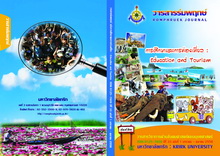การพัฒนาหลักสูตรการสื่อสารการกีฬาในประเทศไทย
Main Article Content
บทคัดย่อ
ผลจากการศึกษาพบว่าต้นแบบหลักสูตรการสื่อสารการกีฬาในประเทศไทย (Prototype) ควรมีองค์ประกอบของหลักสูตรจำนวน 120 หน่วยกิต 5 หมวดวิชาโดยมีสัดส่วนดังนี้ ได้แก่ 1) หมวดวิชาศึกษาทั่วไป 25% (30 หน่วยกิต) 2) หมวดวิชาสื่อสาร 20% (24 หน่วยกิต) 3) หมวดวิชากีฬา 15% (18 หน่วยกิต) 4) หมวดวิชาสื่อสารการกีฬาและฝึกประสบการณ์วิชาชีพ 30% (42 หน่วยกิต) 5) หมวดวิชาเลือกเสรี 5% (6 หน่วยกิต) และผู้เข้าร่วมการวิพากษ์ในฐานะผู้ใช้บัณฑิต มีความเห็นควรใช้รูปแบบสหกิจศึกษาในการฝึกประสบการณ์วิชาชีพ แต่ให้คงรูปแบบ การฝึกประสบการณ์วิชาชีพเดิมไว้ด้วยเพื่อเป็นการยืดหยุ่นในการจัดการการศึกษา
A Curriculum Development for Sports Communications in Thailand
The purposes of this research were 1) to analyze and evaluate the proposed curriculum for Bachelor’s degree program of Sport Communications in Thailand 2) to develop the Prototype of Sport Communications Curriculum which responded to the need of society and economy of the country. The methodology of this research was Delphi technique. The samples were composed of the skilled and experienced experts in mass communications, high executives of governmental and private organizations concerning sport communications, sport media executives and sport reporters in private organizations. These samples gave their opinions and criticized the proposed curriculum of Sport Communications which led to establish the proposed curriculum of the Prototype of Sport Communications. Also, the researcher had taught the three subjects in the proposed curriculum of Sport Communications to the samples of ten local reporters. The three subjects were: Sport News Reporting and Sport Writing, Sport photographing, and New Media and Sport Communications. Moreover, the critical conference was organized to discuss the proposed curriculum of the prototype of Sport Communications by the 20 stakeholders in Sport Communication circles.
The results showed that the proposed curriculum of the prototype of sports communications in Thailand consisted of 120 credits hour of 5 fields of study with a ratio as follows: 1) General education, 25% (30 credits) 2) Courses in Communications 20% (24 credits) 3) Courses in Sports 15% (18 credits) 4) Courses in Sports Communications and Sports Communications professional experiences, 30% (42 credits) 5) 5% for Electives (6 credits). The suggestions and recommendations received from the participants in the critical conference were: the form of cooperative education should be used for the professional experiences. However, the former course for practicum of professional experiences should be maintained for the flexibility in management.
Article Details
ทุกบทความที่ตีพิมพ์ในวารสารมนุษยศาสตร์และสังคมศาสตร์ร่มพฤกษ์เป็นทัศนะและข้อคิดเห็นของผู้เขียนมิใช่ทัศนะของมหาวิทยาลัยเกริกหรือกองบรรณาธิการ การนำบทความส่วนใดส่วนหนึ่งหรือทั้งหมดไปพิมพ์เผยแพร่ต้องอ้างอิงที่มาให้ชัดเจน


